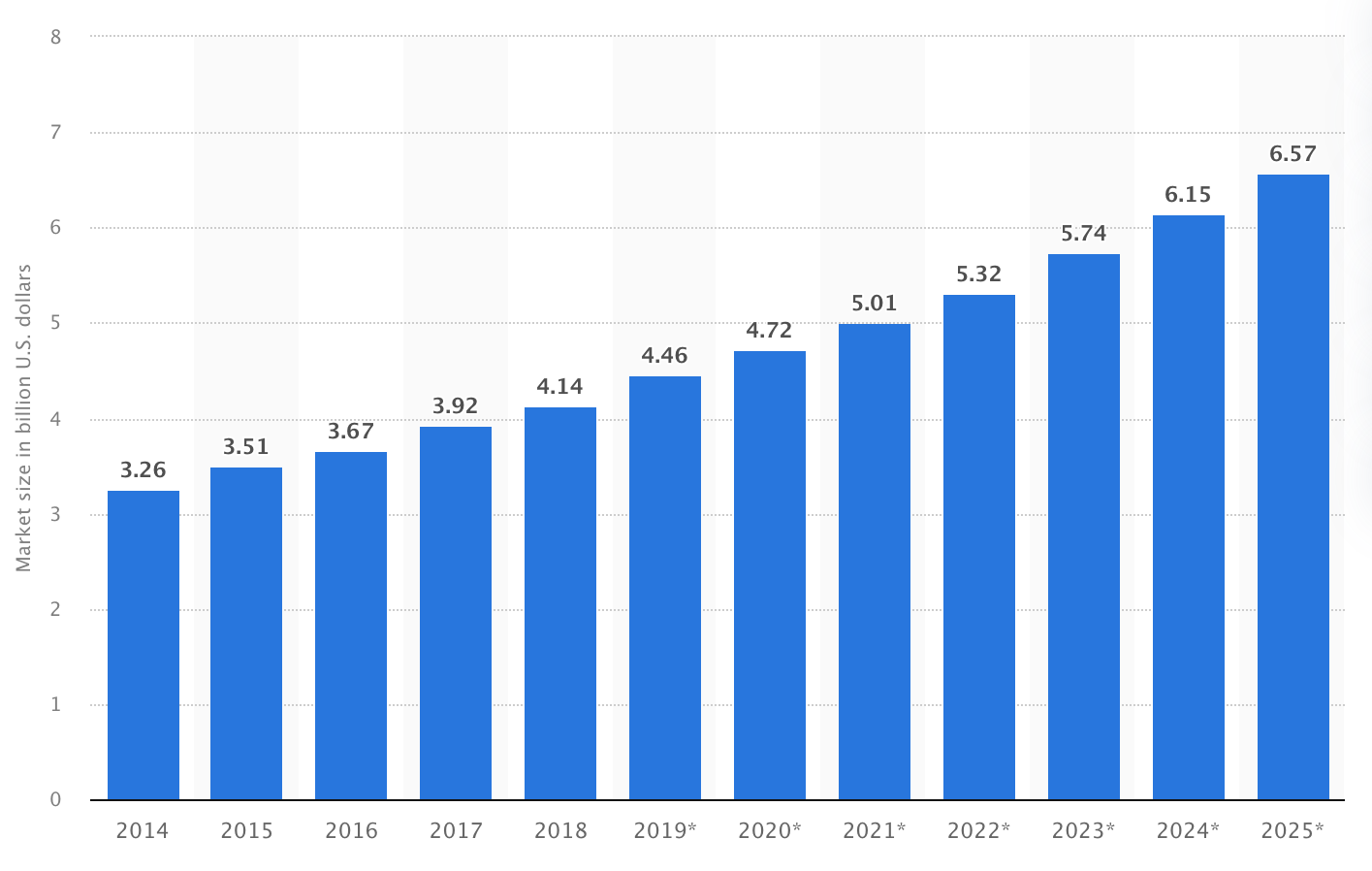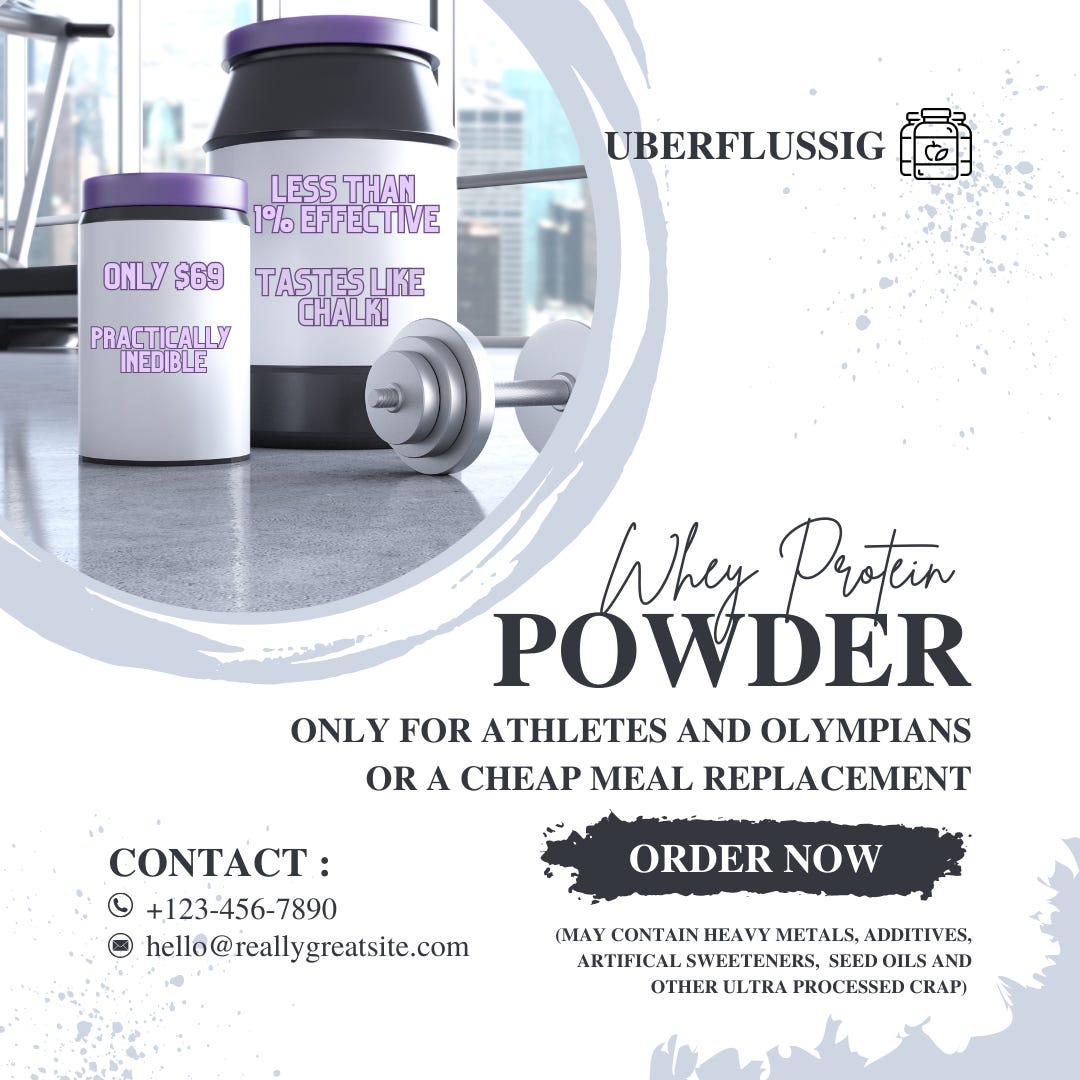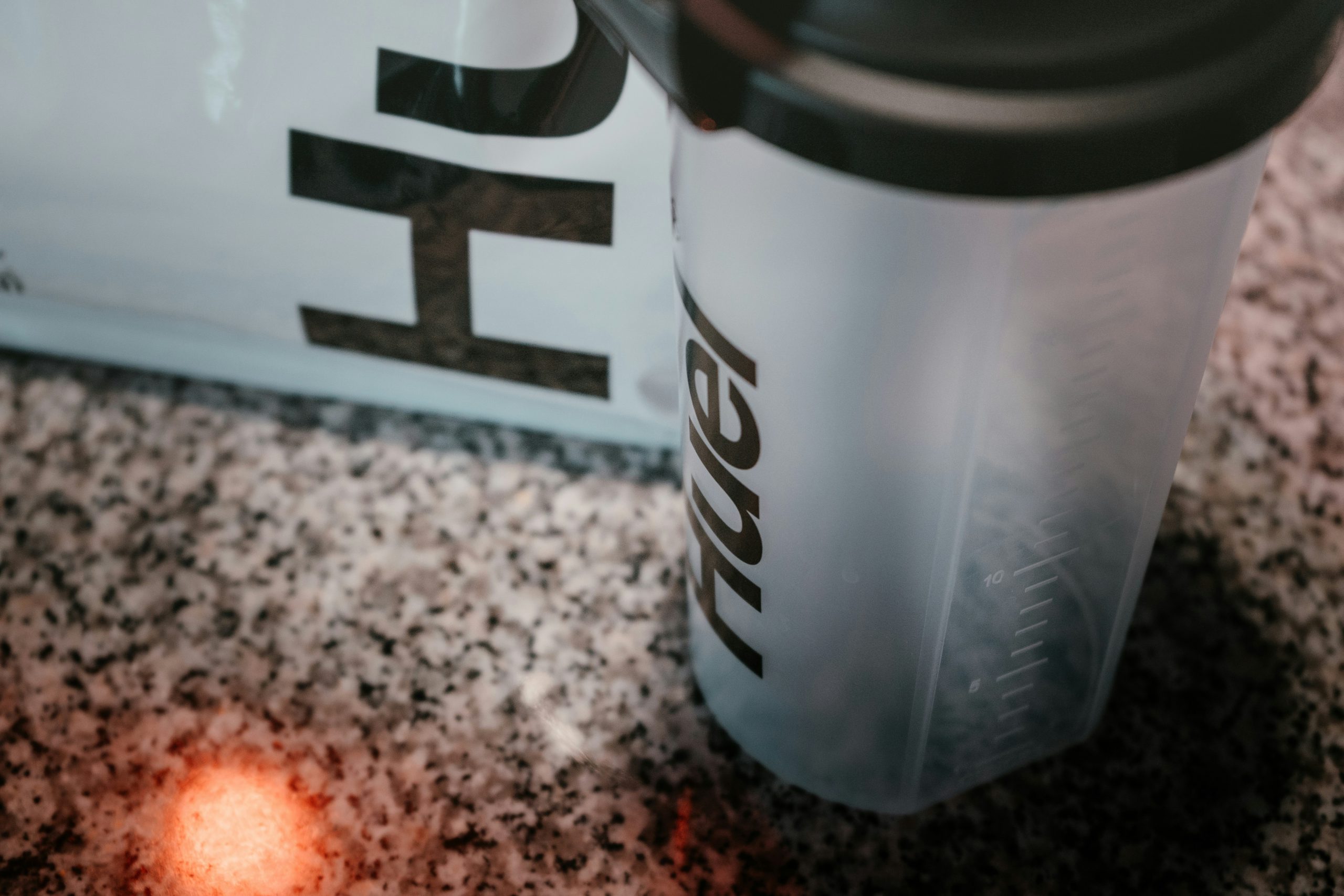Short answer: Yes. Unless you’re a male athlete or a busy “overweight” person using it as a meal replacement.
Please don’t come at me as a protein-powder purist if you feel like my answer is click-baity blasphemy… but stick around and I may just change your mind”
When I started this article, I had a brief but clear idea of what I wanted to say…
Stick with me till the end and you can see why. You might just end up changing your own mind.
My Protein Powder Journey
But for the sake of good journalism, and not letting my emotions control the narrative, I shall bring you the full, unbiased story.
Let’s start with my very first protein shake.
Over a decade ago, when I first started lifting weights, I was a scrawny little thing. I weighed the same 48kg from when I was a teen up until my mid-20s. Then, I started to hit the gym on a regular basis. Skinny-fat they call it. Stick-thin limbs, no muscle definition and a little paunch of “maybe-she’s-born-with-it” belly fat.
Being called chicken-leg most my adolescence, I’d never thought the gym was a place for me. The last thing I wanted was to lose weight. Little did I know that building muscle has the opposite effect on slim frames. It helped me gain weight and size in a way I had never dreamed. I felt incredible! Strong, thicker, indestructible from the twig that looked like it could snap at a gust of wind.
Becoming Vegetarian and Protein Supplementation
It wasn’t until years into my lifting journey that I decided I’d want to be vegetarian again. I’d dabbled with pescetarianism for a couple years prior. I didn’t start eating meat again until university.
I found that giving up meat meant I was rapidly losing weight alongside my 4-5 days a week weight training routine. It wasn’t a healthy look. Assuming it was the lack of protein, I went to buy a {insert a reasonably priced brand} Whey Protein. I looked for the least amount of additives and flavouring, to guzzle down after every workout, and even added a dollop to my oats in the hopes I would bulk up.
As someone that used to vomit out my mother’s breast milk as a baby, you can only imagine the gut discomfort, stomach cramps and gas that whey protein inflicted upon me. I was in a permanent state of bloat belly. I may as well have gone back to my skinny fat days!
Experimenting with Vegan Protein Blends
So I tried the vegan blends, which not only tasted like actual sandpaper; it made my stomach even worse. Pea, quinoa, soybean, and 7 other plant proteins blended together to positively invade your digestive system from all sides. My poor, delicate gut couldn’t handle it.
Minimal Benefits of Protein Powder
Taste and gut disruption aside, I can at least admit that the extra mini-meal and injection of protein did help me put a little of my size back on. Whether it was just the additional calories or the protein intake, we’ll never know. Bearing in mind I was training 5x a week at this point, religiously. Only then did I feel I needed to use a supplement. Shortly after I switched back to adding chicken and fish back into my diet, and I’ve never looked back.
What I did notice though, was the gravitational pull towards “high in protein” products that. Had they not consistently upset my stomach, I may have continued under the pretense that they were the magic weapon.
But realistically, how can a highly processed cookie or “candy” bar, with sprinkles and caramel, identical to a junk food chocolate bar, be GOOD FOR YOU just because it’s infused with protein? It’s actual insanity… scratch that – it’s genius marketing! And the “strong, lean, healthy” bodies around me were lapping it up, while counting calories and eating chicken and broccoli for every other meal.
The Science Behind Protein Supplements
So it was time to investigate; is there a real scientific basis behind magical protein powders and supplements or is consumerist marketing doing it’s job – I mean the brands your favourite fitness influencer is toting got them to look like that after all, no?
There was a pretty decent split between studies that raved about protein supplements and those that cited minimal benefits. As always you know I love to skip down to the funding for the real answers… *hands in a steepling mudra Mr. Burns style*

Funded Protein Powder Studies and Their Biases
This one1 that found that MuscleTech Protein powder enhances metabolism and performance post workout, carried out on 12 healthy, 24 year old men who gym 4x a week, was funded by Iovate Health Sciences, formerly MuscleTech, a brand that sells Supplements and Protein Powder, and is currently leading the market.
However the study was comparing the protein powder with a placebo that was pure carbohydrates, not an actual natural protein source of equal grams – like 25g of chicken breast. So of course there’s going to be a significant increase in muscle recovery!
This one2 was funded by a Korean Milk Company, and claims that whey protein does increase muscle mass – on a group of 32 healthy men… hardly an indication of the effects on perhaps your average Joan – a slightly “overweight” (by nonsense BMI standards) woman who doesn’t lift weights.
Whereas the other half of studies I poured through noticed no significant difference, with this one3 claiming:
“In conclusion, added protein does not appear to improve endurance performance when given for several days, weeks, or immediately prior to and during endurance exercise […] No changes in body composition were reported”
While the above didn’t receive any funding, all the authors cited conflicts of interest by having been given donations and grants by supplement companies – which is why they may have felt the need to sneak into their conclusion that “In summary, increasing protein intake using whole foods as well as high-quality supplemental protein sources can improve the adaptive response to training” i.e. “oh hey supplements are great too though, even though this study clearly states that protein from normal food is enough”
The Role of ISSN
Though the fact that International Society of Sports Nutrition (ISSN) Research Committee peer reviewed this study is a big indicator to why the conclusion wasn’t waxing lyrical about protein powder – it gives me pleasure to note that the ISSN is the only non-profit academic society dedicated to promoting the science and application of evidence-based sports nutrition and supplementation, and makes it very clear that they do not endorse any of their sponsors’ products just because they’re a sponsor….
Natural Whole Foods vs. Protein Supplements
In a Department of Kinesiology and Community Health medical journal, with no affiliation to supplement conglomerates, studies4 showed that having a natural whole food egg (with all it’s macro nutrients intact – equal grams of protein and fats and a teeny bit of carbohydrate) opposed to a “protein-equated egg-white” (just protein, no fats or carbs) was far superior for post exercise muscle gains, despite both having the same amount of protein. Suggesting that eating actual damn foods instead of processed, expensive protein powders that don’t have any dietary fats is far more efficient as a post workout recovery meal.
Frustratingly, the vast majority of studies were done on young, male athletes… in fact 68% of the most cited studies on the effect of protein supplements were carried out on men last I checked

Protein Supplements and the Average Person
But let’s stray away from the gym circuit for a bit and talk about the people who aren’t trying to have unrealistic, washboard abs at the age of 37. Who are more concerned with trying not to sound like a Stomp production every time they get up with the clicks and cracks of their aching bones, or feel confident enough in their skin for that beach holiday coming up in a few months, despite gravity doing it’s thang to those tits and arse. Or is that just me…?
How do protein powder and supplements benefit YOU?
Let’s look at this study5 which cite the effects of whey protein vs soy protein on healthy, overweight adults. Those who consumed whey protein saw at least a kilo of weight loss at the end of the study and inches off their waist, whereas there was no difference with the intake of soy protein… curious.
It’s important to note these individuals were taking the protein shake before meals. I don’t know about you, but when I guzzle down a protein shake before a meal, my hunger practically disappears and I’m in no state to finish my usual plate of food.
It’s also important to point out that this study was part funded by the US Whey Protein Research Consortium. Let’s say that means nothing, and whey protein is far superior to soy because of its higher quality amino acid profile… so why not just down a glass of milk instead? It’s much cheaper and doesn’t taste like artificially flavoured arse, or give you smelly farts.
others: “because you get more protein per ml in a shake than a glass of milk!”
I mean, it feels like there’s some sort of ‘who can eat the most protein’ game being played lately. The reality is that the average moderately active person only really needs under a gram of protein per kg of bodyweight.
If you’re an athlete or a full-time body builder it’s going to be a different story, sure. But let’s assume we aren’t olympians. A surplus of protein can be a burden to the body, as it has to be broken down and converted into other substances with the body. Excess protein that isn’t being used during exercise is converted into glucose, which is stored as – you guessed it – more cushion for the pushing: body fat.
Can you get by without protein powder?
The first thing I learnt in my PT nutrition course was that carbohydrates were essential for increasing muscle mass, whereas muscles can only use a limited amount of protein for growth, provided that there’s enough carbs to fuel the workout. Excessive protein does not convert to muscle, nor does it increase strength and stamina.
While a smaller intake of protein may hinder growth and progress, the body can adapt to insufficient protein and still make progress… waaaaa?! Lightbulb moment! Which might explain why it’s often the under-educated fitness influencers peddling protein and affiliate marketing, rather than the real deal physical trainers and therapists.

Of course I wouldn’t be me if I didn’t trawl through those rare female studies now, would I?
This6 was an insightful read. A study of 488 women between 20 and 65 yrs old studied whether protein supplements helped with weight-loss and lean muscle.
Get this: there was NO DIFFERENCE in lean mass amongst the women who worked out and took protein powder. Isn’t that what it’s marketed for??!
Under 1% difference in lean mass for women who were on a calorie deficit (i.e. diet but not exercising). I wouldn’t be surprised if that was just because they were on a dang diet in the first place!
Imagine: “Your favourite protein powder, just £20 to $50 for 500g! From 0% – 1% effective in getting the lean mass results you desire!”

That’s how they should really be advertised
Is there any good news?
Let’s face it, protein powders and bars are a form of ultra-processed foods. Unless you’re buying the expensive elite brands with nothing except grass-fed whey or organically sourced vegan protein with just one ingredient, it’s a waste of time, full of ingredients, heavy metals. This Harvard study7 found toxins, 25x the recommended BPA allowance, pesticides and heavy metals in the majority of popular powders), seed oils, additives and all sorts of gut health deteriorating crap.
If you desperately can’t live without it – although after reading this… but why? Go for these that were tested safe.
Ahem.. the good news?
Sorry!
- They can be a handy ingredient as a binder when making healthy no-cook desserts and homemade bars. However whenever I’ve used it, it ruined the entire dessert as the pure stuff tastes like powdered toenail.
- Can act as a quick and easy meal. This is especially true for athletes or vegan/vegetarian people who train for over an hour daily.
- Protein powders can be taken as a replacement when there are no other healthy options for “obese” people trying to lose body fat. However, using them as a supplement in addition to your normal 2+ meals a day makes no sense. They aren’t a magic potion and will not make any difference to your body composition.
My top tip: you get adequate protein from a whole-food, varied diet. Save the $£ and book yourself a massage or hire a health coach (like meee!)
So there you have it. Protein Powder… waste of money? For us ladies and non-athletes especially… a resounding YES!




